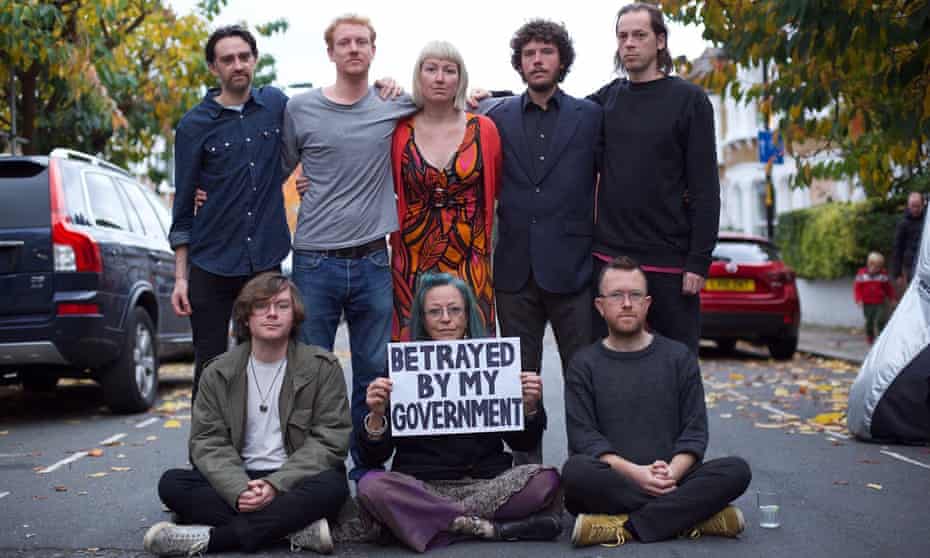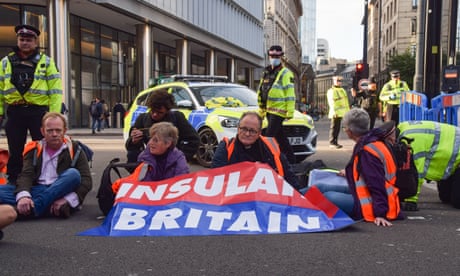Ten Insulate Britain activists spent Christmas in jail as campaigners decry ‘power grab’ over right to protest

Jailed Insulate Britain activists including Ben Taylor (top row, fourth from left) and Oliver Roc (bottom right). Photograph: Insulate Britain/PA
Damien Gayle and Matthew Taylor
Tue 28 Dec 2021
Damien Gayle and Matthew Taylor
Tue 28 Dec 2021
At least 18 peaceful environmental protesters have been sent to prison this year, with 10 spending Christmas Day behind bars.
As concern about the climate crisis grows, activists have been jailed after blocking roads, disrupting court proceedings and in one case climbing on top of an aeroplane in an attempt to draw attention to the escalating emergency.
Campaigners fear their “heavy-handed treatment” is part of a concerted effort by the state to crack down on the right to protest, with the government’s controversial police, crime, sentencing and courts bill criticised by human rights activists as “a dangerous power grab”.
Ten members of the environmental protest group Insulate Britain spent Christmas serving prison sentences for contempt of court for breaching injunctions banning their road block protests, which demanded the proper insulation of the UK’s housing stock. Seven more have suspended sentences.
At least eight other environmental activists have served prison sentences in 2021 for contempt of court actions, according to Extinction Rebellion, including livestreaming from court and gluing themselves to the dock.
Six activists who occupied a tunnel close to Euston station in London in protest against the HS2 high-speed rail link earlier this year narrowly avoided a jail sentence after charges were dismissed by a judge.
The jailed Insulate Britain protesters have sent unrepentant messages from behind bars.
“Locked in my cell for twenty-three and a half hours each day, I miss my family, I miss my friends, I miss nature,” said Oliver Roc, 41, who is serving a four-month sentence at HMP Thameside in south-east London.
“But when I think about the future we are facing I feel a deep conviction that [what] we have done is right, that this is the best place.”
In a campaign of disruptive protests that began on 13 September, Insulate Britain activists blocked major roads in and around London, at the port of Dover, in Manchester and in Birmingham on 19 different occasions. Their tactics angered motorists and were fiercely criticised, with politicians calling the protesters selfish.

Insulate Britain declares M25 ‘site of non-violent civil resistance’
Read more
The activists vowed to continue until the government agreed to a programme of insulating all Britain’s draughty and energy-inefficient homes by 2030 – or until they were sent to prison.
The latest to be jailed was Dr Diana Warner, 62, a retired GP from Bristol.
After a spree of activism, including being found not guilty over a 2019 Extinction Rebellion action at Canary Wharf, and then skipping her contempt of court trial to block a train headed for the Drax power station in North Yorkshire, Warner said she was finally sleeping well.
“The first thing I think about is no longer the climate and environment emergency because I know I’ve done my best and can take a bit of a breather,” she told the Guardian from HMP Bronzefield in Ashford, Surrey.
“Being in prison for climate activism seems very odd. But in such a disjointed world it feels to me like the right place to be.”
Ben Taylor, 26, is serving the longest sentence. He was jailed for six months after telling judges if they freed him he would “go out and block the highway at the earliest opportunity” and would keep doing it until the government acts.
He said life at Thameside was mostly boring. “I was treated a bit rough at first, made to feel alienated, vulnerable and powerless, but I’m on a good wing now and have made a few friends. It’s really not that bad for me.”
James Brown, the Paralympian released this month after being jailed for gluing himself to a plane in an XR action in 2019, said it was important for those spending Christmas in prison to remember they had “done the right thing”.
Brown, who spent 10 weeks in Wandsworth prison in London, said: “It is tough for them and their families at Christmas but it is necessary ... Most of the positive, radical changes we have seen have come about because of peaceful protest and civil disobedience and that is what we need to tackle the climate and ecological crisis. In the end, if you are not resisting then you are complicit.”
Emmanuelle Andrews, the policy and campaigns manager at the human rights group Liberty, said: “Protest is not a gift from the state, it’s a fundamental right, and one that has been attacked for years by a government that wants to make itself untouchable. The heavy-handed treatment – both by police and the government – of protesters over the past year follows a long-term trend seen for several years from a government that has sought to threaten protesters into silence.
“The government and police already have extensive powers to detain and criminalise protesters. But the policing bill is an attempt to take this even further. It is an attack on the rights of everyone who has a cause they believe in, from climate activists to grieving families looking for answers and justice.”
No comments:
Post a Comment